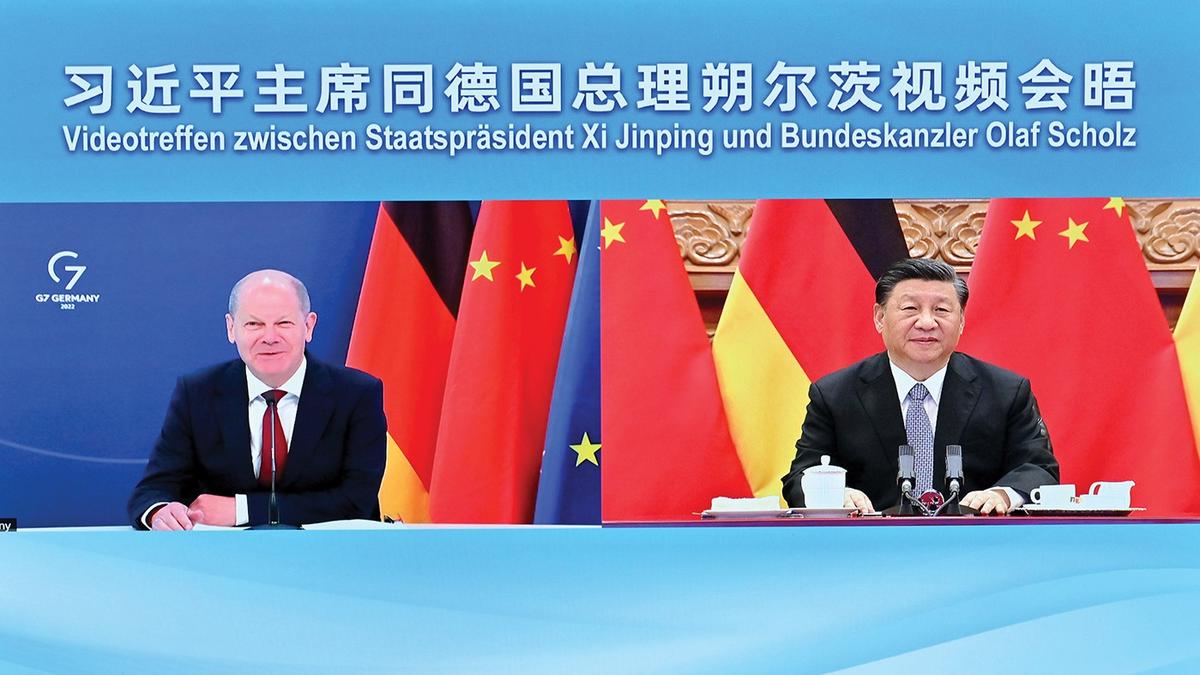German Chancellor Olaf Scholz's visit to China is set to help expand Sino-German trade and investment ties for years to come, according to experts in China and Europe.
Scholz will visit China on Friday at the invitation of Premier Li Keqiang. It will be his first trip to China since taking office in December.
Michael Borchmann, a former director of the European and International Affairs Department of the Hessian State Chancellery in central Germany, said he hopes that German Chancellor Olaf Scholz will act in the best interest of Germany rather than listen to United States-influenced voices in German political parties and one-sided media
"In my eyes, the actual travel of Chancellor Scholz to China is of great importance," said Michael Borchmann, a former director of the European and International Affairs Department of the Hessian State Chancellery in central Germany.
He noted that China has been Germany's largest trading partner for the past six years and said that the Chinese market is indispensable for Germany's automotive industry, the backbone of the German economy.
"One reason for our fruitful and good relations with China is that Scholz's predecessor, Angela Merkel, appreciated China very much, visited China 12 times and built up a relationship of mutual trust," said Borchmann, who has visited China 16 times.
"And this was very beneficial for Germany. I hope that Olaf Scholz will follow the path of Angela Merkel," he added.
Borchmann also said he hopes that Scholz will act in the best interest of Germany rather than listen to United States-influenced voices in German political parties and one-sided media that recycle the US rhetoric of decoupling from China.
ALSO READ: German leader's visit signals ties on upswing
Ding Chun, director of the Center for European Studies at Fudan University, said that while some German political parties such as the Greens have been politicizing economic issues following the Russia-Ukraine conflict, major European nations such as Germany and France have their own strategic thinking that is unlike that of Washington.
"The visit by Scholz, and possibly soon by French President Emmanuel Macron, show that major European nations disapprove of" calls by some in the US for decoupling, said Ding.
He cited the $10 billion investment in Zhanjiang, Guangdong province, announced recently by German chemical giant BASF and other huge investments by other leading German companies as a reflection of the win-win nature of the two countries' trade and investment ties.
 President Xi Jinping (right) meets with German Chancellor Olaf Scholz, via video link from Beijing, on May 9, 2022. (YUE YUEWEI / XINHUA)
President Xi Jinping (right) meets with German Chancellor Olaf Scholz, via video link from Beijing, on May 9, 2022. (YUE YUEWEI / XINHUA)
There is a great interdependency between Europe and China, and Germany is one of the biggest players on the European side. Open talks between both leaderships on the highest level to share different perceptions but to strive for reaching common goals could be very meaningful and could alleviate the pressure which was building up over time by sheer isolation.
Jochum Haakma, chairman of EU-China Business Association
"It's not at all short-term investment," he said.
Jochum Haakma, chairman of EU-China Business Association, said that the timing of Scholz's visit is "very opportune and timely", since Germany is China's biggest European investment and trading partner.
ALSO RED: Chinese, German leaders hail 50 years of relations
"There is a great interdependency between Europe and China, and Germany is one of the biggest players on the European side. Open talks between both leaderships on the highest level to share different perceptions but to strive for reaching common goals could be very meaningful and could alleviate the pressure which was building up over time by sheer isolation," he said, referring to travel disruptions over the past three years caused by the COVID-19 pandemic.
"There lies a huge responsibility on the shoulders of both world powers to act right and not wrong," he said.
Lai Suetyi, associate professor in the Center for European Studies at Guangdong University of Foreign Studies, said that bringing a business delegation to Beijing just after the 20th National Congress of the Communist Party of China can be seen as an effort by Scholz to save the German economy.
"With soaring energy prices, many German companies see no choice but to move production outside, and China has been one of the top destinations. With consumers cutting their spending, German products need to find other buyers", and China's middle-income group offers a solution, she said.
Hosuk Lee-Makiyama, director of the Brussels-based European Centre for International Political Economy, said that a period of inflation means poor prospects for export-led growth, and there are no new market openings in the US, Europe or India for the moment.
READ MORE: China, Germany to deepen cooperation in various fields
"Yet as half of Germany's GDP is derived from exports ... Scholz is likely out of options, aside from focusing on the Chinese market when it rebounds after the (COVID-19) shutdowns," he said.
He said he believes that Europe could invest heavily in areas such as Chinese offshore wind or civil aviation, given the contracts recently won by consortiums like Airbus.


